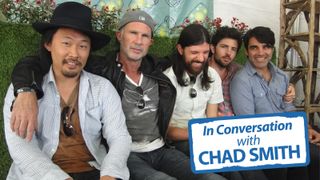In Part One of Chad Smith's "invisible interview" with The Avett Brothers, the drumming icon and the modern Americana superstars kicked back before performing at the Firefly Music Festival in Dover, Delaware, and discussed, among other things, their working relationship with mutual producer Rick Rubin and the politics of busking.
In Conversation: Chad Smith with The Avett Brothers concludes with Part Two, during which Chad and the Avetts (frontmen Scott and Seth Avett, bassist Bob Crawford and cellist Joe Kwon) get into such matters as pre-tour rehearsals, meeting their heroes, career longevity, creating the ultimate setlists and the mercurial style of Bob Dylan.
On this particular day, the summer air was stifling, and the Artist Compound tent was packed with noisy fellow performers and their friends (and friends of friends, it seemed), but Chad and the boys paid no mind, enjoying a spirited, free-wheeling and laughter-filled chat.
Seth Avett: I wanted to ask, if you all... when the Chili Peppers don't play for a month at a time, or a few weeks at a time, do you all rehearse? Do you all get together and get chemistry happening before you go on the road? Or do you just rehearse? We have just never been a rehearsal band. There were times early on where we were able to make time for practice, but life gets more complicated, you have more responsibilities, and we have a lot of trouble getting together to rehearse. When we do, it makes us so much better of a band. We don't do it enough.
Is this something that you all have sort of like mapped out? Like, "We're going to practice, we're going to jam for this much time?"
Chad Smith: Yeah, that's a good question. Right now, we're in not a weird spot, but we're not playing all the time. Usually, it's we make a record and we'll go and rehearse, because we want to play those new songs. We'll try to play a lot of those, and at least have them to where if we want to play them, we can, we've rehearsed. There's lots of them we've never played live before. It's like, "Is this one going to work? I don't know." We go through that. Also, really we're re-learning the old ones.
Seth Avett: It's tough.
Chad Smith: You've got to remember them. You've got a lot of words to remember, and then to be able to play and not think about it.... The last thing you want is "Does that thing go twice?" You're not in the moment anymore. We rehearse before tours, about I'd say three weeks, maybe a month.
Seth Avett: Every day of the week?
Chad Smith: Every day, a few hours a day - maybe three hours. That usually gets everybody's chops up. There's nothing the same as like, "Practice at this time," nothing exactly.
Seth Avett: Tonight you guys practiced?
Chad Smith: We haven't played since we played in Detroit. We played in Detroit on the 8th of June. So what is it, two weeks?
Scott Avett: That's about like us.
Chad Smith: This is not normal for us. Usually, before we played Coachella, we had a little bit of time off. We actually rehearsed, played a little show before, so we rehearsed for like three days, just to knock the rust off. I don't know if everybody remembers the song, but it's just so... We take a lot of pride in playing well, and Coachella's kind of a big show. We don't care about these... [They all laugh.] I'm just kidding, Dover! It's going to be great.
We'll run through - we've got a little rehearsal room in the back, and we'll jam a little bit. We've got a song we haven't played in a while. For a tour, we rehearse three or four weeks. We play new songs also.
Seth Avett: Man, that sounds so good.
Chad Smith: It's not really what you want to do.
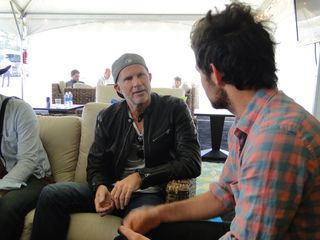
Chad Smith and Scott Avett © Joe Bosso
Seth Avett: You know it's good for you.
Chad Smith: If not, the first three or four shows are going to be not great.
Bob Crawford: I remember being in the studio with Rick, and he singled you guys out as a band that practiced every day, three hours a day. He told us that you guys practiced a lot.
Chad Smith: When we write music, yeah, we write for probably three or four hours, not straight, and we play, talk about this song... it's not like we're rehearsing a set. Yeah, we play a lot. Again, a lot of our music comes from improvising together. The more you jam, the more ideas you're going to get. That's kind of how we work.
Rick is always right. "Keep going, keep going. Some of your best stuff comes out at the end." "We've got 50 songs, we're done." "No, keep going." We write, even if we're... if we're into pre-production, then we would kind of stop, and Rick would come in, and we kind of stop writing and work on the songs that we have to play for him. He's like, "I'll come at 4, and you guys start at 1 and jam for a while." And often he's right. He's…the motherfucker's. It really pisses me off. [Laughs]
I'd say 85 percent of the time, if there's a song idea, "It should be like this, what do you guys think of that?" Again, it's the separating that emotion of somebody who's fresh out of... "This is really fucking great. Wait until you hear the harmony, or wait until the second blah-blah-blah part. This is going to make it." He's like, "I don't know."
Scott Avett: It's very different from the demo.
Chad Smith: We don't really... we'll record songs, but we work; he comes and we play.
Scott Avett: Tom T. Hall, we spent a day with Tom.
Chad Smith: What was he like?
Scott Avett: You've heard his song Storyteller and that?
Chad Smith: Yeah.
Scott Avett: Just like that. His house was in Cox Hollow, on the side of Nashville. If you go there, he's got peacocks walking around, a little basset hound.
Seth Avett: A garden - he's awesome.
Scott Avett: He's really great. He'll just talk. He's got great stories. He said, "I've been waiting in Nashville for you guys to get off the bus." The guy's Roger Miller, Johnny Cash. He says, "If they were around today, we wouldn't be in the business."
An example of this, there was a band... I won't name names, because I don't want to be nasty about it. I love this band. I've researched a little more. The had a stylist, and had someone write their bio for them, and told them how to be... told them what their songs were. He said, "It ruined the whole thing for me. Back in the day, we just were what we were. That's what we'd present. That's what we want." There's a weird world of entertainment, and "here I am" baring my soul.
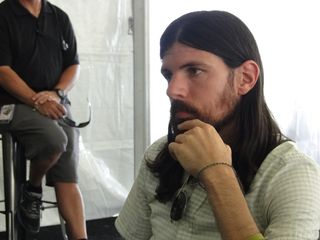
Seth Avett © Joe Bosso
Seth Avett: I remember, we first talked to him on the phone, before we got to meet him. After the phone call, I wrote this down, because again, almost everything he says, Tom T. Hall, he's one of our biggest heroes. Almost everything he said, I was, "I've got to remember that, I've got to remember that." I looked through a journal the other day, and I had written in big letters with a pencil: "Quote from Tom T. Hall on the phone, June whatever, just make music; that's all I can recommend."
Chad Smith: That's keeping it simple.
Seth Avett: That's it - really simple.
Chad Smith: He's right, though. I think certainly in the sense of manufactured things, what's popular today with the reality shows and all that, people... don't underestimate the fans and the public. They can tell.
Seth Avett: No doubt.
Chad Smith: Totally. When it's real, they know. They connect with it. Maybe they don't really know why. I think when I hear something on the radio, I don't know... "There's something cool about this, or something really genuine or honest, or whatever it is." It touches you emotionally. That comes through.
Scott Avett: It's giving an audience credit.
Chad Smith: Exactly. They're not really that …
Seth Avett: Right, you're not - exactly. When you hear music that's either highly saccharine or highly synthetic, it almost feels kind of insulting, like, "I know that's made up." Not that that's necessarily bad; there's a place for that. But like, don't present it to me as the most heartfelt thing, because I can see through that.
Scott Avett: We're in an interesting time, where that's happening a lot. It'll be interesting.
Seth Avett: No doubt.
Chad Smith: It will be, because it's a little …
Seth Avett: Overdone? Yeah, it's got to work itself out.
Chad Smith: It's got to work itself out.
Scott Avett: You know, the '90s was a great time. A lot of real stuff. Country music went through that '70s; there was really real stuff. We were at the CMT Awards two weeks ago, and were sitting there talking about it. It's not just country music entertainment alone; this isn't always a business that you make it being yourself. You're very welcome, and you can make it being yourself, if you're a lucky person.
Chad Smith: You'll have longevity, and it's way more soul-satisfying, I think. People just want to do anything to be famous, or make it or whatever. I want to play music for a living. Some people would do anything to be able to do that. That's fun. I really think that we'll figure it out. Figure out what's real. We might get away with it for a little bit, but at the end of the day, for you to have any longevity, there has to be integrity involved.
Seth Avett: There does. Also, each of us have to, for ourselves... no one else can make this decision for us. Each of us have to make that call. You hear people say, maybe it's a studio musician or somebody that maybe writes just jingles or television or something like that. It doesn't do much for their soul, and they'll say something like, "Well, it beats getting a normal job." I'm like, "For you, maybe." If it does, that's great. For me, it's likely that I would rather do carpentry work. I might rather lay brick. I might rather farm. I don't know. Each of us have to kind of figure out.
You get to a point where it's like, it's not enough just to be sitting and doing a task where you're just hitting the kick drum, hitting the hi-hat and playing the snare on the two or whatever. If that's all you're doing, it might be better for your soul if you were a farmer or something. I know that for me, that line is not way out in the distance. It's a lot closer to me.
Chad Smith: That's the thing. I think that there are different... different people have different things they will do, and how long they will do it.
Seth Avett: Yeah, and I just pray that we can all find out where that line is. Like Scott's saying, some of these folks, they might be seeing it as almost an acting job. If they're going to do it, and treat music in that way, and they feel good about that, then that's good. They need to feel good about it. That's OK. I don't need them to be Elliott Smith. I don't need them to be Kurt Cobain. I need them to be whatever they need to be.
For me, I really yearn for meaning in music. I really long for meaning, and I can't be satisfied with it just being... certain labeling, like it's recorded in high fidelity. I need it to be something a lot more than that. I have to have it. That line is interesting.
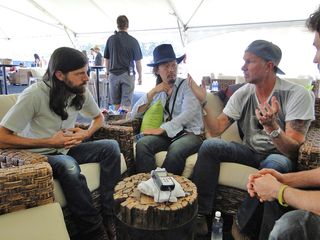
Seth Avett, Joe Kwon and Smith © Joe Bosso
Chad Smith: That's why you is, the way you is [laughs]. That's beautiful. That's why I think people connect with your music, connect with you. You've got to have good songs - that helps. That always helps. Backing up, and it's earnest, and it's honest, and you're playing from your heart, and you leave it out there every night. People pick up on that.
Seth Avett: The respond.
Chad Smith: They appreciate it, and they respond.
Seth Avett: They give you fuel on that. They make it like... as far as energy goes, I know that already, Scott's 37 now, and he's certainly doing things athletically that a 37-year-old wouldn't just get up in the morning and start doing, and probably shouldn't do. I see him after the shows with ice packs on.
Chad Smith: Me, too!
Seth Avett: The people who are responding, you're talking about these people that get it, and respond, they're giving us fuel to do that. Otherwise, you wouldn't just be so motivated, just jumping around, to be so fired up. They give it.
Chad Smith: How many times have you guys gone out and whatever's happening on a day, you've had a lot of travel, you didn't sleep good, you don't feel good, whatever. You get out, and you're ready to play - it happens. I'll be like, "OK, we'll play, whatever." You get up there; you're not at your ultimate, to just go fucking crazy, or feel so connected or so conscious in the moment. It's almost a job at the moment. As soon as you see those people, and the way they respond, it's on. You'd have to be almost fucking dead.
Seth Avett: Had that last night.
Chad Smith: What?
Seth Avett: Had that last night. You've got things going on in your life, or you're tired, or it's a long journey, whatever. You've got to be checking your pulse, man, if you look out and see these people, and don't respond. You need to check your pulse. They're smiling.
For you, this is your job. This is what you do on almost a nightly basis. This person out there, they might have been waiting for three months on this thing. All day, they might have been tailgating in the parking lot all day; they are fired up. They are going to let you know that this is a momentous night. This isn't... you're not clocking in. This is an occasion. We've all been reminding each other lately, especially because of the things going on in our lives, this might be our last... this is not some cliché, this might be the last opportunity. Today might be the last opportunity either one of our bands get a chance to do this. We don't know.
Chad Smith: Absolutely. You don't know what's going to happen.
Seth Avett: You really don't.
Scott Avett: I know last time I saw you guys; the only time I've seen you guys live, and I loved every bit of us. It was awesome. The next day we went to Fayetteville, Arkansas, and I injured the hell out of my back.
Chad Smith: [Laughs] You wrote me, like, "Man, we're going to really go crazy."
Scott Avett: We were on fire, but by the end of the show, I was like, "Oh, God."
Chad Smith: You don't feel it when you're doing it. Next year, ice pack.
Scott Avett: It was.
Chad Smith: There is something with going out and playing, and just being able to have the opportunity to go out and make people happy. Like I say, a guy or a girl or whoever are there, and the may have never seen you before, or they've seen you before and they're really excited.
You want them to make this night feel special. That's why we don't stand in the same spot so that light hits us, and that's why we jam between songs, and that's why we talk to the crowd and let them know that we're here in the moment, too. We're not "Hello, Cleveland," you know; we let them know. I go see bands - I don't want to see nobody not take a fucking risk. I hate it when they just play it like the record... unless it's classical music, that's great. I appreciate that. But if you're a rock and roll band, where's the danger? Where's the risk? Where's the "fuck it" and let shit fucking fly? People fucking love that shit. They love it when you fall down.
Seth Avett: That's right, and we do.
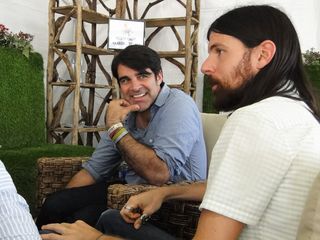
Bob Crawford and Seth Avett © Joe Bosso
Chad Smith: You fuck up, and then you laugh. You may be, "Oh, shit," but they're like, "Ah, this is great." Or you play that little part different than the record and they say, "Ahhh!" - like they love it. Sometimes you can get caught up like, "OK, here's the set list, and we're playing this song." You're playing Under The Bridge for the 99 thousandth time in a row, but it's this guy's favorite song. If I don't fucking play it good…
Seth Avett: And he's never seen you all do it in real life.
Chad Smith: Right, and he's freaking out. I'm sure it's the same thing with you guys. People who really connect, sometimes you've got to remind yourself of that.
Seth Avett: No doubt. And you're there for them.
Chad Smith: Like Tom T.
Seth Avett: If you're playing Under The Bridge" for the 90 thousandth time, like you have to keep in mind, like the work has already been done for that guy's connection. This is that guy's favorite song; he's listening. You made that work. I don't know how long, Blood Sugar's like -
Chad Smith: Twenty years ago.
Seth Avett: Yeah, that work has been like…
Chad Smith: It's got 20 years of life…
Seth Avett: His interest has been like gaining and gaining and gaining, to where like that work is already done. You don't have to be having the best night of your life to perform it; you've just got to be there, and just respect that he is... this guy or that many people are excited to hear that song. It's awesome. It really is.
Chad Smith: If you can get a couple that connect to people like that.
Seth Avett: I read at one point that that was one that was just sort of a sketch in a notebook, like having Rick...
Chad Smith: It was, you're right. It's rare for us - usually the music comes first, and then Anthony will come up with the melody and the words and stuff afterwards… almost 95 percent of the time. Californication is another one that he had come up with the melody to. And Under The Bridge - you know, the poems that he had written... Rick saw it at is house. "What's this?" "Uh, it's… it isn't for the band." We weren't playing any slow songs back then. He's like... "No, this is really good."
Seth Avett: Very vulnerable.
Chad Smith: Yeah, and different. It isn't about pussy and… [Laughs]
Seth Avett: You weren't doing any songs that were slow or not about that. [Laughs]
Chad Smith: We were young men in our 20s, with virile sex drives. Now we're just old and tired. This is our first song, the one that was different kind of, and we remember doing it. And then he took it to John, the guitar player, and he came up with the chords and slowed it to Flea and I. We didn't think anything really of it at the time.
Seth Avett: An anthem.
Chad Smith: It was cool, kind of Neil Young-y. That was it. Even when we recorded it, it was different. It was cool to have to have on the record.
Scott Avett: It affected all of our lives.
Chad Smith: Like switching up your sets and stuff - maybe you've struggled with that. How do you... is there a set list writer in the band?
Scott Avett: Usually the two, three of us will do it. Seth and I will do it. Bob will check off and say, "OK."
Chad Smith: Bob's the quality control? "We haven't done this one in a while. We got this, this and this, same tempo or something, same key."
Seth Avett: Or, like you said, it's good about taking risks. Bob will say, "We've done this, this many nights. It's time to do something dangerous," whatever. We make the set list normally an hour, or a couple hours, before we go out. Like today, we knew we were going to be doing stuff during the day, I wrote it at 5 o'clock this morning, and…
Chad Smith: Does it have anything to do with what singing …

Scott Avett © Joe Bosso
Seth Avett: Yeah, our voices on backup are usually the same.
Scott Avett: We generally are doing like... we both have a third or a fifth harmony above a lot of the vocals. We're aware of the sound.
Seth Avett: The screaming, right now, that's the divide for us. We've been screaming a lot, and we're learning now if you have any weakness, the screaming will blow it out. We really let it rip.
Chad Smith: Sometimes that's hard, because you're caught in the moment.
Scott Avett: If you've been smoking cigarettes and had whiskey, you could just do it and the next day you'd be like…
Seth Avett: Yeah, and there are proper ways to do it, like a band like the Deftones. That singer, Chino Moreno, he can just do that. He's in his 40s - he knows the proper way to do it. It's just part of his vocal repertoire. Us, our songs are based in melody - all melody, all singing. When we scream, it is like that moment... [Imitates screaming] And then the next day you're like, "Oh, God, I wish I wouldn't have screamed so much." [Chad laughs] Isn't it a lot of guesswork, really, as far as set lists? Aren't you just guessing about what the personality of the night will be?
Chad Smith: You don't know how you're going to be playing. You don't know what the crowd is going to be like. Obviously, a time constraint - we're playing this long, so this many songs will be good. Taking the tempo… and we always do this one here, and we do this one there.
Seth Avett: We definitely find couplings that work, like this feels good going into this. Some sections remind me some of how you all did. You all bridge a lot of things together, keeping things flowing. We have some things that develop like that on stage, with a festival atmosphere, like Scott's saying. We're definitely not going to play three ballads, four ballads in a row, because not only are they losing it, but you're losing it.
We try to keep it high energy and know the pockets. We also know after you play six rippers, it's like, "OK, now's the time for the solo song," where Scott goes out and sings, and we all sit back and drink some water, or whatever kind of deal. Definitely part of it is logistical, but a lot of it is we just let it flow, and then try to be malleable enough to where if we get up there and we were wrong about what the personality of the crowd might be like, to be like, "All right…"
Scott Avett: We didn't do set lists until about three years ago. We were just all punk rock.
Chad Smith: Next!
Seth Avett: Yeah, just going out and doing tunes. That was one of those things that we were just holding off, because it is punk rock. "We're not going to make a set list."
Chad Smith: Fuck set lists!
Seth Avett: Finally, we were like, "OK, we've got 11 guys that need to know what song's next. We need a set list." Exactly.
Seth Avett: You guys, with as many albums as you've put out, there's probably a long list of songs that people are expecting.
Chad Smith: With us, it's a lovely problem to have, I guess, because you have songs that people want to hear.
Seth Avett: You play new ones, too.
Chad Smith: That's the thing. You try to find the balance of new songs and ones that… probably we play 25 songs, or 23 songs in a set. I would say there's probably 15 or 16 that we sort of always do. We don't have to do, but we feel we should play. As you said, we've got a lot of records.
The other ones, those are the ones that are hard to pick, and they keep rotating. That keeps it fresh. I think that's... You know, you can't make everyone happy. "Oh, you don't play anything off blah, blah, blah record," you know. "How come you don't do stuff off Freaky Styley?" I'm like, "No one really knows them." We like them, but they're going to be like... If we do two or three of them, there's only so many.
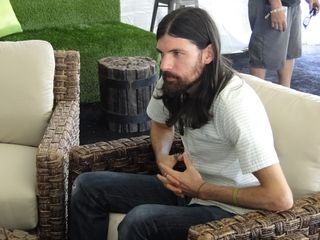
Seth Avett © Joe Bosso
Seth Avett: So much real estate.
Chad Smith: It's like, those are the ones that we really enjoy. Me And My Friends from Uplift Mofo, ones that nobody knows, unless they're a fan, they don't know that.
Seth Avett: It's cool, if you do an old one, it's like there's like 12 dudes that are going to be like …"Yes."
Chad Smith: The other 15,000 are going, "What?" You gotta do something for both of those guys. I really think you do. I don't think you should go the other way and play Van Morrison and not do, "I won't do any of my hits."
Scott Avett: "We'll never do Under the Bridge again." That would break a lot of hearts.
Chad Smith: Yeah.
Bob Crawford: What we do, we go back in the catalog and revise old songs, like not change lyrics or chords …
Seth Avett: New energy, always.
Chad Smith: That's cool. Last time I saw Dylan, everything was a shuffle. Everything!
Scott Avett: And he's just dropping the lyrics on top of the shuffle. We've got the chords and the beat.
Chad Smith: "That song, is it the same one?" No? It was so quiet. We could talk.
Seth Avett: I saw him, like, nine years ago. He played only one instrument, and it was a tiny little keyboard. The whole time, a tiny little keyboard.
Chad Smith: He played it the whole time?
Seth Avett: The whole time. He never touched a guitar the whole night. I think he only touched the piano with one hand. It was nuts.
Chad Smith: He's out there.
Seth Avett: He's a true artist.
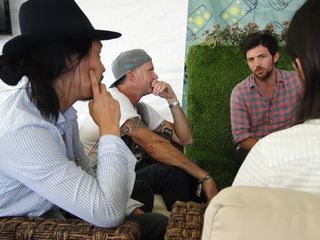
Joe Kwon, Smith and Scott Avett © Joe Bosso
Chad Smith: You don't know what you're going to get, so I guess that's the thing. He never fucking stops touring. He never stops. He's not a young pup. It's not like he's out there jumping around, but still. I don't know how he does it.
Seth Avett: I saw some interview with him not too long ago, where he was talking about that, the never-ending tour concept and all this. He said he just felt like he was trying to pay back the deal. He got offered so much, and he was just trying to make it even somehow.
Chad Smith: Really?
Seth Avett: Yeah, he was trying to even the score in a way.
Chad Smith: Live a Live Nation deal?
Seth Avett: No, no, like with God. It was like early on, he was given songs and... It was on 60 Minutes. It was a recent one. They asked him like, "Do you still have songs like that come to you?" He was like, "No." He said, "I can't write songs like that anymore. I can do other things. I can go out and play the songs."
Chad Smith: He can play one-handed fucking Casio [laughs].
Seth Avett: One-handed piano. And do a shuffle with every song. [Laughs] And we're sitting here hashing out like, "OK, when you rehearse, it's like this. When you make a set list, it's like that." All those conversations enter his mind, and he's done with them before they even come to it.
Scott Avett: He had the harmonica one time, and he went back to piano playing. He never touched the guitar.
Seth Avett: What's hilarious is at this point, it's almost like the negative space. If he plays every song in the shuffle, he's got one of the best bands on the planet. It's not like they can't do anything that they put their mind to at all without much rehearsal.
Bob Crawford: They can do a fox trot and a shuffle, at the same time.
Chad Smith: It's kind of perverted, you know?
Seth Avett: It is, but it's really interesting to us. I wonder if, for the layman, the music fan, what it feels like. For us, it's almost kind of better, because it's so interesting.
Chad Smith: It's fucking rocking!
Seth Avet: If you go there and you want to hear, Like A Rolling Stone, it's going to be a disappointment.
Chad Smith: God bless him.
Seth Avett: That's right. That's right - for so many reasons.
Chad Smith: You see the Don't Look Back movie… All the interviews and the press, and they thought he had the answer for everything, the '60s culture and The Beatles.
Seth Avett: Those experiences are reserved for a very, very precious few. Elvis, Michael Jackson - that's about it. We talked about this after we performed with him at the Grammys. He's been dealing with people with everyone going hush every time he walks in a room for, like, 50 years.
Chad Smith: How can he not be like that?
Seth Avett: Yeah.
Bob Crawford: No one treats him like a real person, like an equal.
Seth Avett: We had some interactions with him that were very... at the after-party when I said hello to him and thanks and things, he was totally... he didn't seem eccentric.
Chad Smith: He's not like a weirdo.
Bob Crawford: I always wondered how Tom Petty felt in the mix. He wasn't how he is today. And Jeff Lynne?
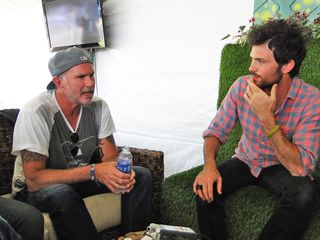
Smith and Scott Avett © Joe Bosso
Scott Avett: Jeff Lynne, yeah.
Chad Smith: Petty obviously has heard of Dylan, right? Who hasn't? But Petty…
Bob Crawford: That was after they toured together. It was probably after.
Chad Smith: Yeah, they were friendly, you know.
Seth Avett: Speaking of that, I was thinking of that, with Tom Petty. I saw a bit in Rolling Stone.
Chad Smith: Is he playing here tomorrow?
Seth Avett: Is he? I know he's put some stuff out in the press about how he's going to retire some songs. He's a little bit tired of playing some of his songs.
Chad Smith: I saw that, too. I think Free Fallin' is one of them.
Seth Avett: People are not going to like it.
Chad Smith: He's like, for this tour, they doing lesser-known cuts. He says, "I'm free of Free Fallin'," or something like that.
Seth Avett: He's done a lot of good songs.
Bob Crawford: I thought it was his farewell tour a few years ago. Now he's back at it. I'm really glad. I love Tom Petty.
Chad Smith: Me, too. What else is he going to fucking do? I mean, I'm not saying you should go out and be Bob Dylan and tour till you don't stop. I guess he doesn't have to perform, but if you've been a musician that long, that's a big part of who you are. Can you guys imagine not playing?
Seth Avett: I can't really. I'm sure it's possible, but it doesn't come to mind right off what you would retire into.
Scott Avett: If we had a year off or something, I think all of us would be like, "A couple months, we've got to do this, we've got to do that." Learn a new instrument.
Chad Smith: Something.
Scott Avett: We'd have to. Once it gets in you, you gotta make it. You're just driven to.
Chad Smith: Yeah, it's part of your fabric.
Scott Avett: And then, sometimes on the road I'm like, "What are we doing? This is crazy."
Chad Smith: Then you go home for two weeks…
Scott Avett: And you're like - yeah!
Chad Smith: Nancy will say to me, 'Go play the drums with somebody somewhere. Get out of here! You're driving me crazy.' I'm like, "What is it?" [Laughs] Las night - we haven't played in a couple weeks - last night in Times Square, you heard of Andrew WK? He's a drummer, I guess - he is, 'cause he was playing in Times Square, in a store, trying to break the world record of trying to play the drums for 24 hours non-stop. So he's in there just... I was like, "That's fucking great."
Seth Avett: In where?
Chad Smith: In Times Square, not outside in a store, like in an open store, like a sunglasses store. It was part of some awards show, I guess. Just as he was doing it, he was like, "Hey, man …" and I was like, "What's he doing?" He was playing the drums for 24 hours straight. I go, "If he makes it to the end, I'll go and I'll play with him in the last hour - how about that?" Sure enough…
Seth Avett: He made it?
Chad Smith: Fucking guy made it. [Laughs] I go up, and he's just... [Imitates drumming.] He was beat. Can you imagine? Like 22 hours, I was like, "How are you doing? Are you like hallucinating?" He's like, "Yeah! Is that you? Are you really here?" I'm like, "Yeah, I'm really here." "OK." I sat down, and we played at the drum set. He fucking played. I was like... [Imitates playing.] he was doing things physically…
Seth Avett: Still playing.
Chad Smith: Yeah, he could still work it.
Scott Avett: Who gave him that booth?
Chad Smith: I don't know. He wasn't making records, but he was playing. He kept on trading off and whatever. I came back, and I felt so much better. My wife said, "What'd you do?" I said, "I played in Times Square." She said, "What did you play, and where?" "In the store," and I explained to her. I just need to play. I don't know if it's a physical thing or a mental thing.
Scott Avett: Would you play with us tonight? Do you want to?
Chad Smith: Yeah! Will you ask me?
Seth Avett: Sure. Next time, Chad, let's do that double top. That's a good idea. It was.
Chad Smith: OK, we'll do it. Last time I played with you guys, what was it, Bonnaroo? Oh, Austin City Limits. We were playing and going through it. I was going, "What about the end?" The last chord was extended a little bit into double time. We worked it out and it slowed down. We got up there... at least I know I did. Maybe I started too slow.
Seth Avett: You started at like the last measure.
Chad Smith: Yeah… How did that happen? See?
Seth Avett: It's still a good idea. Now we've got a second chance.
Chad Smith: Now we got a second chance.
Seth Avett: Life is full of second chances. It's about second chances.
Scott Avett: Or thirds, too.
